Editor’s note: The following is extracted from Literary Hearthstones of Dixie, by La Salle Corbell Pickett (published 1912).
Seeing the name of Joel Chandler Harris, many people might have to stop and reflect a moment before recalling exactly what claim that gentleman had upon the attention of the reader. “Uncle Remus” brings before the mind at once a whole world of sunlight and fun, with not a few grains of wisdom planted here and there. The good old fun-loving Uncle has put many a rose and never a thorn into life’s flower-garden.
Being in Atlanta some years ago, when Mr. Harris was on the editorial staff of the Constitution, I called up the office and asked if I might speak to him. The gentleman who answered my call replied that Mr. Harris was not in, adding the information that if he were he would not talk through the telephone. I asked what time I should be likely to find him in the office.
“He will be in this afternoon, but I fear that he would not see you if you were the angel Gabriel,” was the discouraging reply.
“I am not the angel Gabriel,” I said. “Tell him that I am a lady—Mrs. Pickett—and that I should like very much to see him.”
“If you are a lady, and Mrs. Pickett, I fear that he will vanish and never be found again.”
Notwithstanding the discouragements, I was permitted to call that afternoon in the hope that the obdurate Uncle Remus might graciously consent to see me. I found him in his office in the top story of the building, an appropriate place to avoid being run to covert by the public, but inconvenient because of the embarrassment which might result from dropping out of the window if he should have the misfortune to be cornered. To say that I was received might be throwing too much of a glamour over the situation. At least, I was not summarily ejected, nor treated to a dissolving view of Uncle Remus disappearing in the distance, so I considered myself fortunate. I told him that I had called up by telephone that morning to speak to him.
“I never talk through the telephone,” he said. “I do not like to talk in a hole. I look into a man’s eyes when I talk to him.”
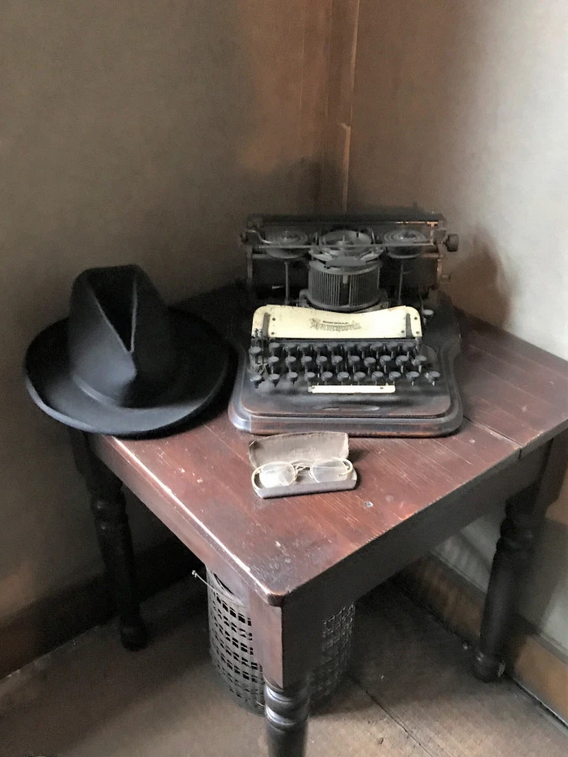
When Uncle Remus was fairly run to earth and could not escape, he was quite human in his attitude toward his caller; his only fault being that he was prone to talk of his visitor’s work rather than his own, and a question that would seem to lead up to any personal revelation on his part would result in so strong an indication of a desire for flight that the conversation would be directed long distances away from Br’er Rabbit and the Tar Baby. He was a born story-teller, and had not the made author’s owl-like propensity to perch upon high places and hoot his wisdom to the passing crowd. The expression “literary” as applied to him filled him with surprise. He called himself an “accidental author”; said he had never had an opportunity of acquiring style, and probably should not have taken advantage of it if he had. He was always as much astonished by his success as other people are by their failures.
I met him once at a Confederate reunion in Atlanta, where I took my little grand-children, who had been brought up on Uncle Remus, to see him. Having heard their beauty praised, he cautioned them not to think too much of their looks, telling them that appearance was of little consequence. He gave each of them a coin, saying, “I don’t believe in giving money to boys; I believe in their working for it.”
“Well,” said little George, “haven’t we earned it listening to Uncle Remus?”
“If that is so, I’m afraid I haven’t money enough to pay you what I owe you.”
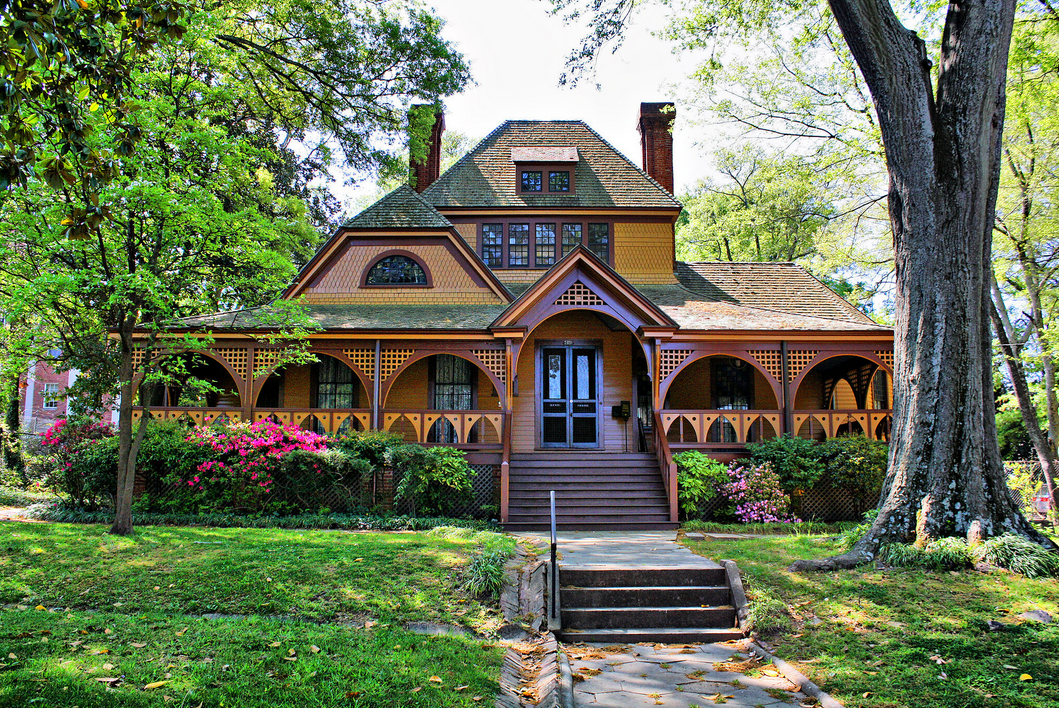
He was at ease and natural and like other people with children. He invited them to come to his farm and see the flowers and trees, telling them how his home received the name of “The Wren’s Nest.” As he sat one morning on the veranda, he saw a wren building a nest on his letter-box by the gate. When the postman came he went out and asked him to deliver the mail at the door, to avoid disturbing Madam Wren’s preparations for housekeeping. The postman was faithful, and the Wren family had a prosperous and happy home.
“You must never steal an egg from a nest,” he told the boys. Curving one hand into an imitation nest holding an imaginary egg, he hovered over it with the other hand, rubbing it gently, explaining to the boys, who watched him with absorbing interest, how the egg would change to a beautiful fluff of feathers and music, and after a while would fly away among the trees and fill the woods with sweet sounds. “If you destroy the egg, you kill all that beauty and music, and there will be no little bird to sit on the tree and sing to you.” The boys assured him that they had never taken an egg, nor even so much as looked into the nest, because some birds will leave their nests if you just look into them.
At the reception given to Mrs. Jackson, Mrs. Stuart, Winnie Davis, and myself, Mr. Harris was invited to stand in line, but declined. It would be difficult to imagine him as standing with a receiving party, shaking hands with the public. He was asked to speak, but that was even less to be expected. The nearest he ever came to making a speech was once when he sat upon the platform while his friend, Henry O. Grady, was addressing a large assemblage with all that eloquence for which he was noted. When he had finished, the call for “Harris” came with great volume and persistency. He arose and said, “I am coming,” walked down from the platform and was lost in the crowd.
Uncle Remus wrote his stories at “Snap Bean Farm,” in West End, a suburb of Atlanta. They filled his evenings with pleasure after the office grind was over. If no one but himself had ever seen them, he would have been as happy in the work as he was when the public was delighting in the adventures of Br’er Wolf and Br’er B’ar. In that cosy home the early evening was given to the children, and the later hours to recording the tales which had amused them through the twilight.
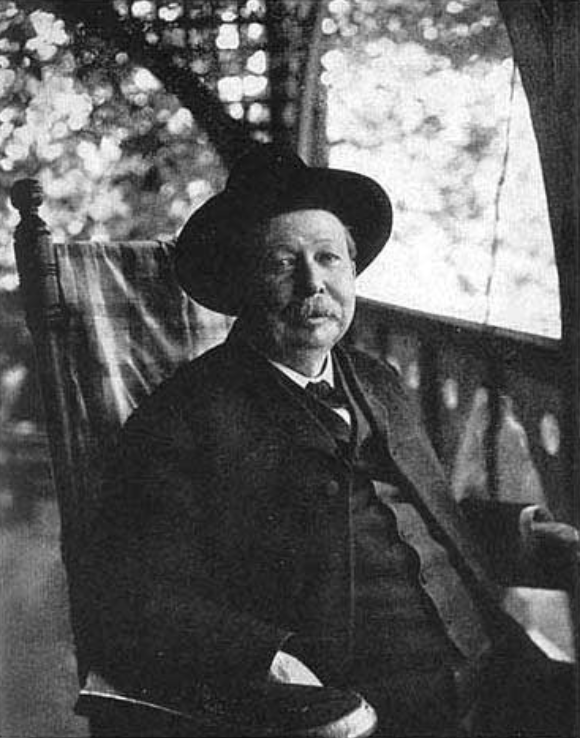
A home it was, not only to him but to all who came in friendship to see him in his quiet retreat. There was no room in it for those whom curiosity brought there to see the man of letters or to do honor to a lion. The lionizing of Uncle Remus was the one ambition impossible of achievement in the literary world. For everything else that touched upon the human, the vine-embowered, tree-shaded house on Gordon Street opened hospitable doors.
Joel Chandler Harris was born in Eatonton, the county-seat of Putnam County, Georgia, and in his early days attended the Eatonton Academy, where he received all the academic training he ever had. His vitally helpful education was gained in the wider and deeper school of life, and few have been graduated therefrom with greater honors.
At six years of age he had the good fortune to encounter “The Vicar of Wakefield,” than whom, it is safe to assert, no boy of such tender years had ever a better and more inspiring friend. This beloved clerical gentleman led young Joel into a charmed land of literature, in which he dwelt all his life.
In the post-office at Eatonton was an old green sofa, very much the worse for wear, which yet offered a comfortable lounging place for the boy Joel, adapted to his kittenish taste for curling up in quiet retreats. There he would spend hours in reading the newspapers that came to the office. In one of them he found an announcement of a new periodical to be published by Colonel Turner on his plantation nine miles from Eatonton. In connection with this announcement was an advertisement for an office boy. It occurred to the future “Uncle Remus,” then twelve years old, that this might open a way for him. He wrote to Colonel Turner, and a few days later the Colonel drove up to town to take the unknown boy to his plantation. So beside the editor Joel Chandler Harris rode to the office of the Countryman and to his happy destiny. It has been said that but for the Turner plantation there would have been no Uncle Remus, but what would have become of the possibilities of that good old darky if the little Joel had not enjoyed the acquaintance of a good-natured post-master who permitted him to occupy the old green sofa and browse among the second-class mail of the Eatonton community?
Surely there was never a better school for the development of a budding author than the office of the Countryman, and the well-selected library in the home of its editor, and the great wildwood that environed the plantation.
Best of all, there were the “quarters,” where “Uncle Remus” conducted a whole university of history and zoölogy and philosophy and ethics and laughter and tears. Down in the cabins at night the printer’s boy would sit and drink in such stores of wit and wisdom as could not lie unexpressed in his facile mind, and the world is the richer for every moment he spent in that primitive, child-mind community, with its ancient traditions that made it one with the beginning of time.
At times he joined a ‘coon hunt, and with a gang of boys and a pack of hounds chased the elusive little animal through the night, returning home triumphant in the dawn. He hunted rabbits in the woods, and, maybe, became acquainted with the character of the original Br’er Rabbit from his descendants in the old plantation forest.
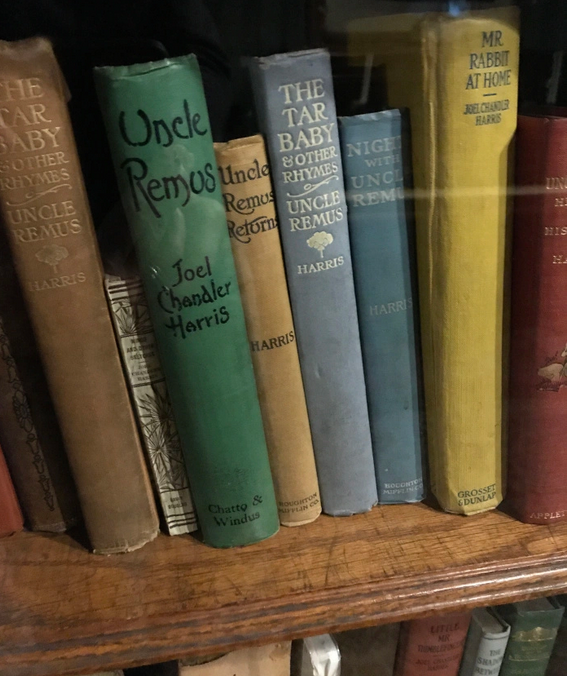
From the window near which his type-case stood he saw the squirrels scampering over trees and roofs, heard the birds singing in the branches, caught dissolving views of Br’er Fox flitting across the garden path, and breathed in beauty and romance to be exhaled later for the enchantment of a world of readers.
In Colonel Hunter’s library, selected with scholarly taste, he found the great old English masters who had the good fortune to be born into the language while it was yet “a well of English undefiled.” In that well he became saturated with a pure, direct, simple diction which later contact with the tendencies of his era and the ephemeral production of the daily press was not able to change.
It was in the office of the Countryman that Joel Chandler Harris made his first venture into the world of print, shyly, as became one who would afterward be known as the most modest literary man in America. When Colonel Hunter found out the authorship of the bright paragraphs that slipped into his paper now and then with increasing frequency, he captured the elusive young genius and set it to work as a regular contributor. In this periodical the young writer’s first poem appeared: a mournful lay of love and death, as a first poem usually is, however cheerful a philosopher its author may ultimately become.
This idyllic life soon ceased. When the tide of war rolled over central Georgia, it swept many lives out of their accustomed paths and destroyed many a support around which budding aspirations had wound their tendrils. The “printer’s boy” sat upon a fence on the old Turner plantation, watching Slocum’s Corps march by, and amiably receiving the good-natured gibes and jests of the soldiers, who apparently found something irresistibly mirth-provoking in the quaint little figure by the wayside. Sherman was marching to the sea, and the Georgia boy was taking his first view of the progress of war.
Among the many enterprises trampled to earth by those ruthless feet was the Countryman, which survived the desolating raid but a short time. It was years before the young journalist knew another home. For some months he set type on the Macon Daily Telegraph, going from there to New Orleans as private secretary of the editor of the Crescent Monthly. When the Crescent waned and disappeared from the journalistic sky, he returned to Georgia and became editor, compositor, pressman, mailing clerk, and entire force on the Forsyth Advertiser.
A pungent editorial upon the abuses of the State government, which appeared in the Advertiser, attracted the attention of Colonel W.T. Thompson and led him to offer Mr. Harris a place on the staff of the Savannah Daily News. Happily, there lived in Savannah the charming young lady who was to be the loving centre of the pleasant home of “Uncle Remus.” The marriage took place in 1873, and Mr. Harris remained with the News until ’76, when, to escape yellow fever, he removed to Atlanta. He was soon after placed on the editorial staff of the Constitution, and in its columns Uncle Remus was first introduced to the world.
In his home in West End, “Snap-Bean Farm,” he lived in calm content with his harmonious family and his intimate friends, Shakespeare and his associates, and those yet older companions who have come down to us from ancient Biblical times. Some of his intimates were chosen from later writers. Among poets, he told me that Tom Moore was his most cherished companion, the one to whom he fled for consolation in moments of life’s insufficiencies.
Mr. Harris had no objection to talking in sociable manner of other writers, but if his visitor did not wish to see him close up like a clam and vanish to the seclusion of an upper room it was better not to mention Uncle Remus. Neither had he any fancy for the kind of talk that prevails at “pink teas” and high functions of society in general. Anything that would be appropriate to the topics introduced in such places would never occur to him, and the vapory nothingness was so filled with mysterious terrors for him that he fled before them in unspeakable alarm.
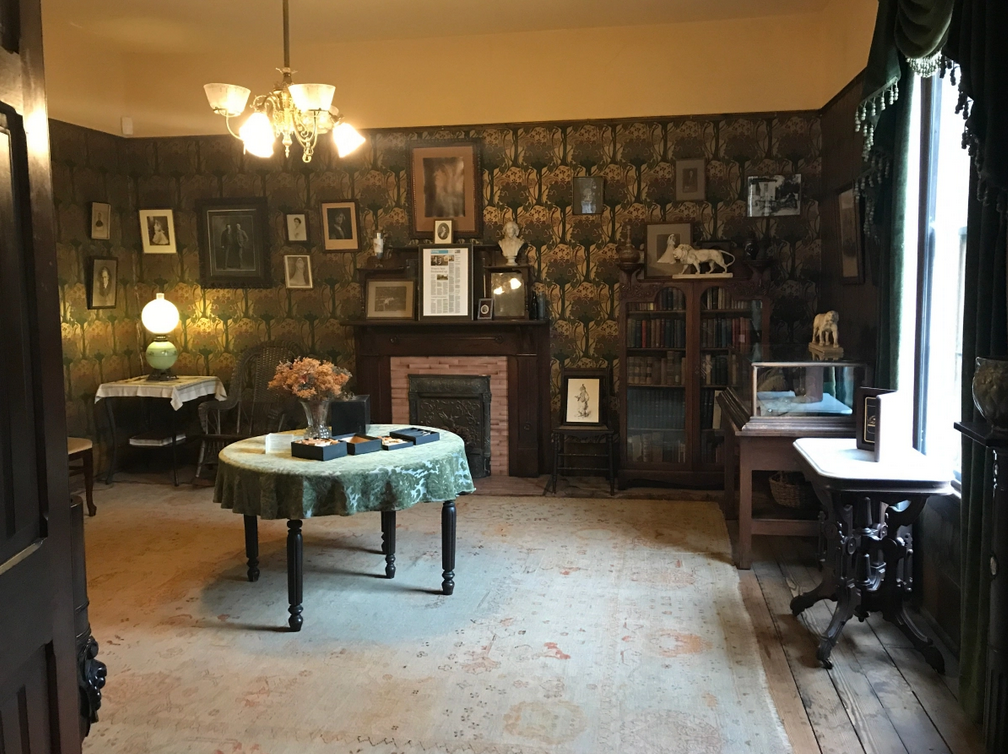
“Snap-Bean Farm” was all the world that he cared for, and here he lived and wove his enchantments, not in his well-appointed study, as a thoroughly balanced mind would have done, but all over the house, just where he happened to be, preferably beside the fire after the little ones had gone to bed, leaving memories of their youthful brightness to make yet more glowing the flames, and waves of their warmth of soul to linger in enchantment about the hearth.
It was a sunny, happy day when I visited “Snap-Bean Farm.” A violet-bordered walk led me to the pretty frame cottage, built upon a terrace quite a distance from the street—a shady, woodsy, leafy, flowery, fragrant distance—a distance that suggested infinite beauty and melody, infinite fascination. When the home was established there, the rumbling and clang of the trolley never broke the stillness of the peaceful spot. A horse-car crept slowly and softly to a near-by terminus and stopped, as if, having reached Uncle Remus and his woodsy home, there could be nothing beyond worth the effort. There were wide reaches of pine-woods, holding illimitable possibilities of romance, of legend, of wildwood and wild-folk tradition. It was a country home in the beginning, and it remained a country home, regardless of the outstretching of the city’s influences. Joel Chandler Harris had a country soul, and if he had been set down in the heart of a metropolis his home would have stretched out into mystic distances of greenery and surrounded itself with a limitless reach of cool, vibrant, amber atmosphere, and looked out upon a colorful and fragrant wilderness of flowers, and he would have dwelt in the solitudes that God made.
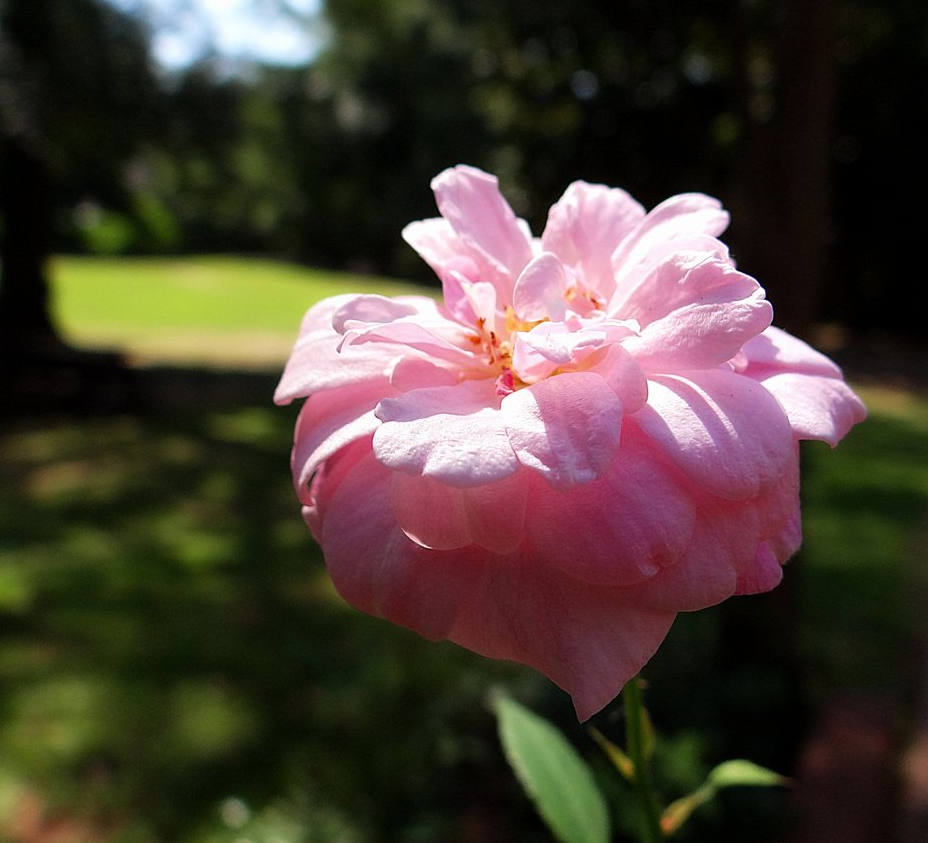
As I walked, a fragrance wrapped me around as with a veil of radiant mist. It came straight from the heart of his many-varied roses that claimed much of his time and care. The shadow of two great cedar trees reached protecting arms after me as I went up to the steps of the cottage hidden away in a green and purple and golden and pink tangle of bloom and sweet odors; ivy and wistaria and jasmine and honeysuckle. Beside the steps grew some of his special pet roses. Their glowing and fragrant presence sometimes afforded him a congenial topic of discourse when a guest chanced to approach too closely the subject of the literary work of the host, if one may use the term in connection with a writer who so constantly disclaimed any approach to literature, and so persistently declined to take himself seriously.
In the front yard was a swing that appealed to me reminiscently with the force of the olden days when I had a swing of my very own. As I “let the old cat die,” we talked of James Whitcomb Riley’s poem, “Waitin’ fer the Cat to Die,” and Mr. Harris told me of the visit Riley had made to him not long before. Two men with such cheerful views of life could not but be congenial, and it was apparent that the visit had brought joy to them both.
I did not see the three dogs and seven cats—mystic numbers!—but felt confident that my genial host could not have been satisfied with any less.
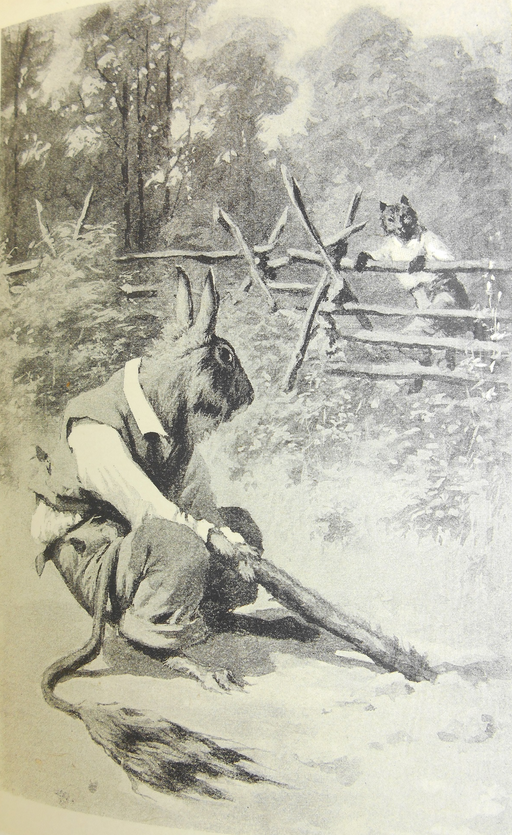
The charmed circle in which Br’er Fox and Br’er Rabbit shone as social stars is yet with us, and we shall not let it go out from our lives. The mystic childhood of a dim, mysterious race is brought to us through these beings that have come to us from the olden time “when animals talked like people.”
“The Sign of the Wren’s Nest” is peopled by these legendary forms with their never-dying souls. They lurk in every corner and peer out from every crevice. They hide behind the trees, and sometimes in the moonlight we see them looking out at us as we walk along the path. They crouch among interlacing vines and look at us through the lacy screen with eyes in which slumber the traditions of the ages.
We look for the Magician who, with a wave of the hand, made all these to live and move before us. We know he must be there. We “cannot make him dead”; but he can make himself and us alive in the life of the past. A little door, with one shutter of Memory and one of Faith, opens before us, and he comes to dwell again in the world which he created in “The Sign of the Wren’s Nest.”

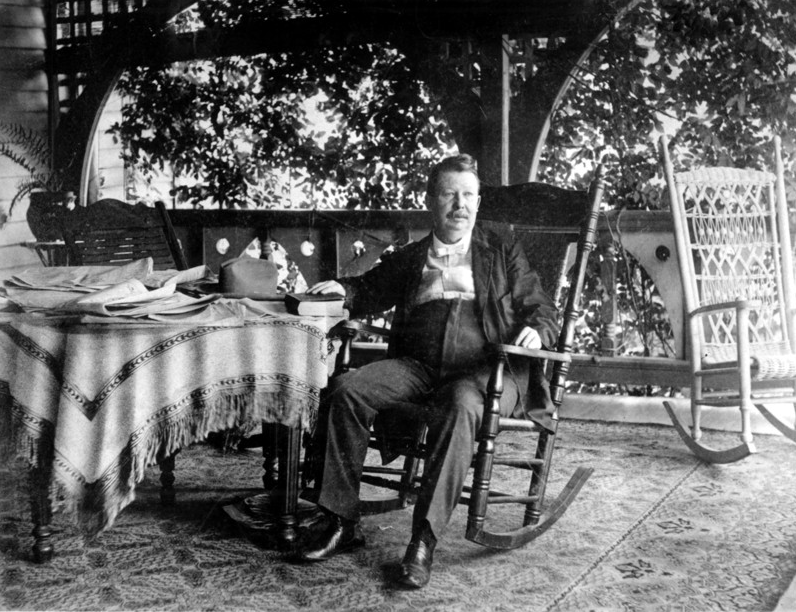




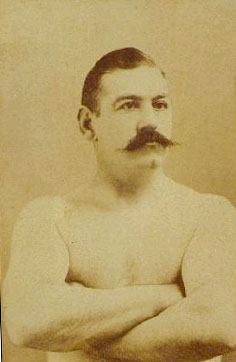

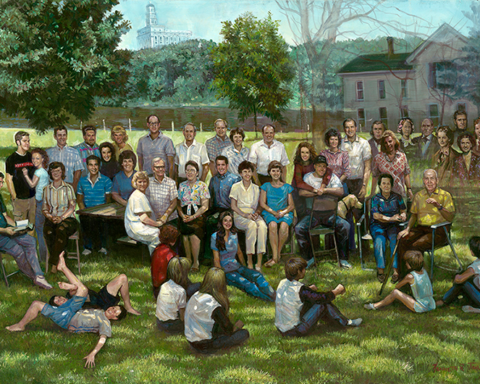

5
4.5